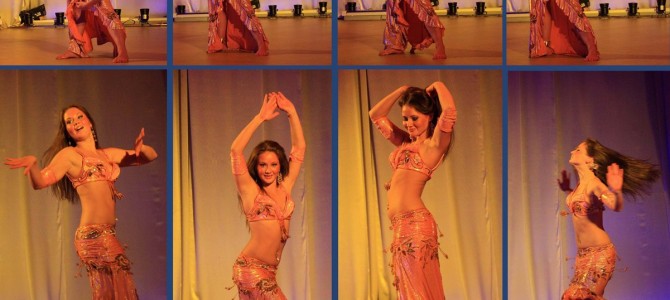
Randa Jarrar is back to remind us just how atrocious an idea “cultural appropriation” is.
A few weeks ago, the Palestinian-American feminist made a splash with an article in Salon explaining “Why I Can’t Stand White Belly Dancers.” Her argument, to the extent she offers one, is that this is a peculiar form of exploitation called “cultural appropriation.” She ends with the advice: “Find another form of self-expression. Make sure you’re not appropriating someone else’s.”
Now that is an interesting principle if we were to apply it consistently. The mind reels. Enormous parts of our culture have been influenced by and therefore “appropriated” from someone else. Much of contemporary American popular music was “appropriated” in one way or another from Southern blacks, as are whole styles of dance. Tap dance was appropriated by whites from blacks, who appropriated it from the Irish. Or maybe the other way around, or both. Parts of the American Arts and Crafts style were “appropriated” from traditional Japanese homebuilding. Franz Liszt encouraged his contemporaries to “appropriate” melodies from the Hungarians like all get-out. Classical architecture was “appropriated” from the Romans by the descendants of the very barbarians who sacked the empire. And so on.
What Jarrar condemns as “appropriation” is actually “learning.” It is the transmission of new ideas, and the more sources they come from, the more vibrant the culture.
A lot of people traced the disturbing implications of Jarrar’s view. Eugene Volokh asks why we don’t complain about Asian musicians who play Beethoven—accompanied by a photo of Yo-Yo Ma.
A great parody picks up Jarrar’s theme and extends it.
Eating at Chinese restaurants by white Americans and other majority non-Chinese should be looked down upon, as it entails the physical ingestion of Chinese culture. Anyone who suffers a serious but non-permanent physically debilitating injury shouldn’t be allowed the use of a wheelchair, as this is an ableist appropriation of differently abled culture.
And some of the more old-fashioned liberals have come to the defense of “polyglot” culture. This last piece notes that the style we call “belly dancing” was once common all around the Mediterranean and predates the Arab conquest of North Africa—meaning that belly dancing, too, was “appropriated” by the Arabs back when they were the conquering imperial power.
But like I said, Jarrar is back to answer her critics by explaining that they are, um, white.
Guys in the Washington Post and the Atlantic wrote whitesplanations about how cultural mixing is a good thing; other men on racist blogs called me a moron. Daily News Egypt published a response by a non-Egyptian, non-Arab woman. G Willow Wilson wrote in defense of me (and since she’s not an angry woman of color, her argument is being touted as reasonable and sane)…. There were also violently angry emails and tweets that, in a typically sexist and fatphobic way, criticized my appearance and my size.
As an exercise in racial victimization, this is almost as good as the performance of the Egyptian columnist who suggests that “Egypt should sue Israel for the ten plagues, Turkey for the Ottoman occupation, France for the Napoleonic invasion, and Britain for colonialism.”
But this makes sense because Jarrar’s piece is apparently part of a series on “intersectionality,” the study of “intersections between different disenfranchised groups or groups of minorities.” In other words, it’s a game of one-upmanship to determine who belongs to the largest number of intersecting victim groups and is therefore the most oppressed.
And that’s very instructive about what drives this idea of “cultural appropriation.”
Perhaps Jarrar can be dismissed as a crank (especially if you read the rest of her rambling, non-responsive reply). But the idea of “cultural appropriation” is pervasive and keeps cropping up. Consider the reaction to the story of Jennifer Grout, a blonde-haired girl from Massachusetts who took an interest in Arab music and ended up almost winning “Arabs Got Talent,” an Arabic-language version of “American Idol.” One commenter on the story says, “She sounds amazing. Should she be allowed to do this, though? Isn’t this cultural appropriation?” I love the word “allowed,” as if everyone has to apply to a United Nations Office of Appropriate Culture to decide how they can speak, what they can wear, what they can sing, and so on, based on their genetic heritage.
I cannot improve on the earthy eloquence of another commenter’s reply: “People like you suck. What, she can’t sing in a different language in a different style? Here, let me use some good old New York language for ya since that is where I am from and I guess all that I am allowed to use.” What follows is some very New York language, indeed.
And that gets to the crux of the issue. The left loudly promotes its flattering self-image as the side of the debate that is more culturally open and advanced—more intellectual, artistic, and cosmopolitan. But the doctrine of “cultural appropriation” shows how the left’s obsession with racial identity and resentments ends up imposing the narrowest kind of parochialism.
This is the basic contradiction of the left: it is a highly intellectualized form of anti-intellectualism. It uses wide, abstract, universal concepts—in order to break us down into tiny, Balkanized subgroups defined by physical attributes and geographical accidents.
Then again, maybe the left knows all about “cultural appropriation”—because for decades it has unjustly appropriated the issue of culture itself.









